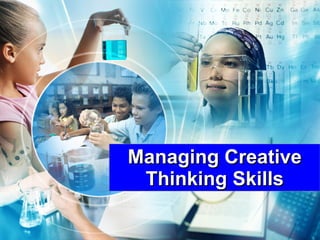
Creative Thinking Skills
- 1. Managing Creative Thinking Skills
- 2. You can download this presentation at: www.studyMarketing.org Visit www.studyMarketing.org for more presentations on Marketing, Strategy, Innovation, and Branding
- 4. Don’t Believe the Experts ! “ Television won’t be able to hold onto any market it captures after the first six months. People will soon get tired of staring into a box every night.” Don’t Believe the Experts ! (Darryl F. Zanuck, Head of 20th Century Fox, 1946)
- 5. Don’t Believe the Experts ! “ That’s an amazing invention, but who would ever want to use one of them?” (US President Rutherford B. Hayes, after participating in a trial telephone conversation between Washington and Philadelphia in 1876).
- 6. Don’t Believe the Experts ! “ I think there is a world market for about five computers” Don’t Believe the Experts ! Don’t Believe the Experts ! (Thomas J. Watson Sr., Chairman of IBM, 1943)
- 7. Conceptual Blocks to Creativity
- 8. Blocks and Blockbusters to Creativity Following the rules Breaking the rules Making assumptions Checking assumptions
- 9. Blocks and Blockbusters to Creativity Fear of failure Risk-taking culture Over-reliance on logic Use imagination and intuition
- 10. Conceptual Blocks Conceptual blocks Mental obstacles that constrain the way the problem is defined and limit the number of alternative solutions thought to be relevant
- 11. Conceptual Blocks The more formal education individuals have The more experience they have in a job The less able they are to solve problem in creative ways…
- 12. Conceptual Blocks Formal education often produces… “ right answers”, analytical rules, or thinking boundaries Experience in job teaches….. proper ways of doing things, specialized knowledge, and rigid expectation of appropriate actions Individuals lose the ability to experiment, improvise, and take mental detours
- 13. Types of Conceptual Blocks Constancy Vertical thinking One thinking language Compression Distinguishing figure from ground Artificial constraint
- 14. Types of Conceptual Blocks Complacency Non-inquisitiveness Non-thinking
- 18. Three Components of Creativity
- 19. Three Components of Creativity Expertise Motivation Creative Thinking Skills Creativity
- 20. Three Components of Creativity Expertise Motivation Expertise is, in a word, knowledge – technical, procedural, and intellectual Not all motivation is created equal. An inner passion to solve the problem at hand leads to solutions far more creative than do external rewards, such as money.
- 21. Three Components of Creativity Creative Thinking Skills Creative thinking skills determine how flexible and imaginatively people approach problems.
- 22. The Paradoxical Characteristics of Creative Groups Beginner’s Mind Freedom Play Improvisation Experience Discipline Professionalism Planning
- 24. Tools for Defining Problems
- 25. Tools for Defining Problems Kipling Method Problem Statement Challenge Method Tools for Defining Problems
- 35. Tools for Creating New Ideas
- 36. Tools for Creating New Ideas Attribute Listing Brainstorming Visioning Tools for Creating New Ideas
- 47. Creating a Creative Climate
- 48. Organizational Characteristics that Support Creativity and Innovation Risk taking is acceptable to management New ideas and new ways of doing things are welcomed Information is free flowing Employees have access to knowledge sources Good ideas are supported by executive patrons Innovators are rewarded
- 49. Creating a Creative Climate Motivation Challenge Empowerment Fun Freedom Time Support
- 50. Creating a Creative Climate Dynamism Energy Openness Debate and Dialog Experimentation Trust Risk
- 52. End of Material
